PSYCHOLOGY OF US
YOUR RESOURCE LIBRARY
STRESS
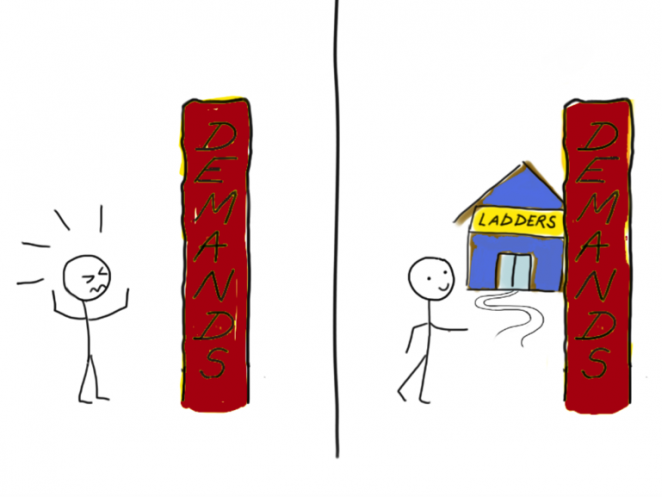
Stress is the way that our mind and body react to demands or threats. Whereas anxiety is worry about what might happen in the future, stress is the response to what is happening now.
Doctors, scientists, and the media warn us that stress is toxic and that We Must Calm Down or suffer the health consequences. This causes a dilemma for many of us. How many people do we know who lead stress-free lives? And how often, despite our best efforts to manage or avoid it, do we encounter at least a moderate level of stress on a regular basis?
Contents:
- What is Stress?
- Signs and Symptoms of Stress
- Causes of Stress
What is Stress?
Stress is the way that our mind and body react to demands or threats. Whereas anxiety is worry about what might happen in the future, stress is the response to what is happening now.
Distress or Eustress?
Stress is our brain’s way of protecting us. While stress overload is harmful, hindering us in the face of difficult life events, other forms of stress invigorate us to rise to the challenge. This positive version of stress is known as eustress. Whether we find a situation distressing or eustress-ing has less to do with whether the stressor is threatening and more to do with whether we think we can handle it.
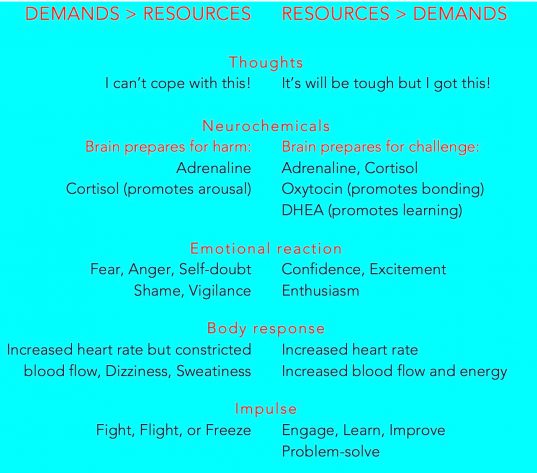
If we perceive a challenge to outweigh our coping resources, then our brains will react with a fight or flight response. If we think that we have the resources to cope, our brain enacts healthier stress responses. Find out more: The Science Behind Stress
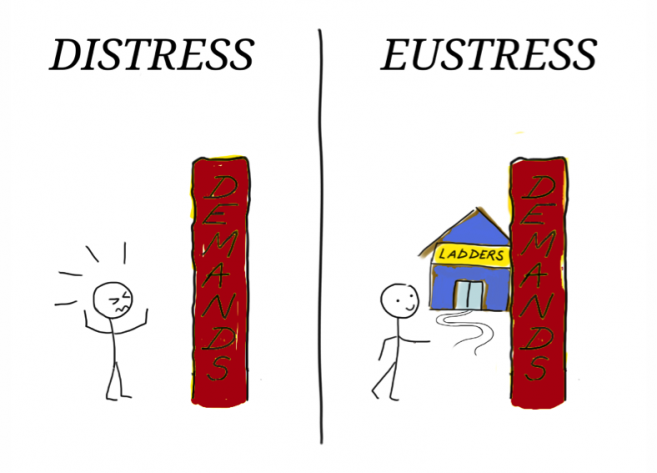
How we label our body’s reactions to stress – heart rate, breathing, body temperature – also determines what emotional response we will have.
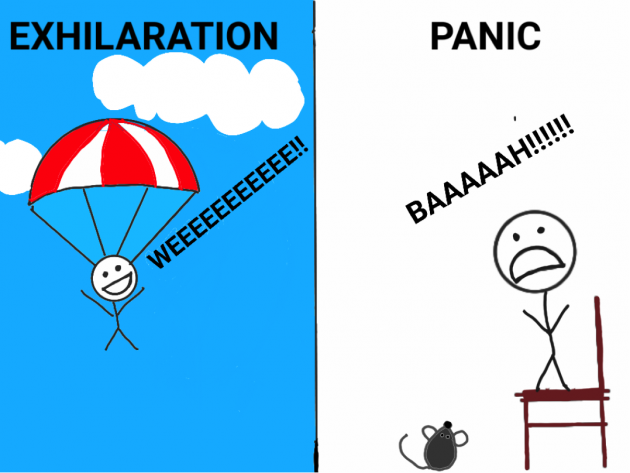
In both situations above, our stickman is experiencing a stress response. When jumping out of a plane, he views his physical sensations – shrieking, shaking, and heart racing – as exhilarating. Though his physical sensations are the same when he spots a mouse, he translates them as evidence of real danger. For example, ‘I think I might be having a heart attack!’ This intensifies his fight or flight response.
Therefore, we experience either eustress or distress, depending on whether we think we can cope and how we interpret its physical effects. The good news is that we have more control over these than we might think (more on that later).
Signs and Symptoms of Stress
When we perceive a threat, our brains release stress hormones that prepare us to protect ourselves or others. This impacts our thinking, physiology, behaviour, and emotions. Everyone experiences stress differently but here are some common stress reactions.
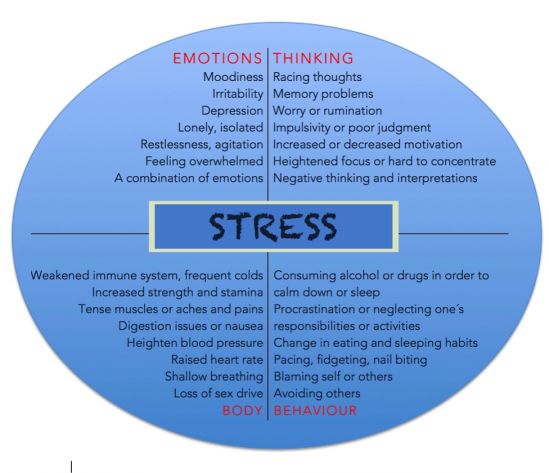
Other psychological or medical issues may cause these symptoms. I provide treatment for stress but a medical doctor will perform diagnostic tests (physical exam, lab tests) that can determine if your symptoms are the result of a medical condition. Tell the doctor about all of your symptoms, even if you think that they are unrelated.
Causes of Stress
Stress can be caused by anything that we perceive as demanding. Two people can have the same experience and have different stress responses. Stress can disproportionate and unrealistic or it can be a rational and reasonable response.
We experience eustress when we perceive something to be challenging but manageable. Positive events such as getting married, running a race, a job interview, graduation, or a promotion can result in eustress. However, positive events can also cause distress if we feel overwhelmed or we think that we will have trouble coping with the changes that they bring about.
Distress occurs when our situation presents us with demands that outweigh our (perceived) ability to cope. Distress can also occur when we think that about disturbing images, distressing memories or when we worry about the past or the future.
What long-term effects does stress have on us?
Chronic stress can have detrimental effects on our physical health over the long-term, these include digestive issues, sleep problems, skin conditions, weight problems, heart disease memory and concentration issues. Being over-stressed can lead to psychological issues such as moodiness, depression, anxiety, and anger issues.
According to research, the factors that seem to have the most impact on how detrimental stress is to our health include the intensity and length of demands, as well as our coping skills (1). Unsurprisingly, research suggests that short-term, moderate stress levels are less damaging to our health than stress that is chronic and severe.
While we may not be able to control the challenges life throws at us, we can increase our ability to cope with them.
Some life circumstances are so distressing that we can´t help but feel overwhelmed. For example, bullying or abusive relationships, crisis situations, or past tragedies and losses that still haunt us. If you feel overwhelmed to the point that your ability to function in everyday life is impaired, the other posts on this site address the more severe effects of ongoing stress: Anxiety, Depression, Traumatic Memories.
You don’t have to go through this alone. You can contact me or seek the help of a professional in your area. Seeking help can change your life.
Find out more: How Monkey Therapy Helps You Handle Stress, The Science Behind Stress, Steps You Can Take Now to Get Better at Stress.
References and Contributors
Anthony Damasio. Descartes’ Error: Emotion, Reason, and the Human Brain (2005).
Paul Gilbert. The Compassionate Mind. Compassion Focused Therapy (2010).
Daniel Goleman. Emotional Intelligence. (1996).
Kelly McGonigal. The Upside of Stress: Why Stress Is Good for You, and How to Get Good at It (2015).
Donald Meichenbaum. Stress Inoculation Training (1985).
Daniel Collerton. (2016). Psychotherapy and brain plasticity. Frontiers in Psychology.
Rick Hanson. (2013). Hardwiring Happiness. The New Brain Science of Contentment, Calm and Confidence.
Hasse Karlsson. (2011). How Psychotherapy Changes the Brain. Psychiatric Times.
Joseph LeDoux. (1996). The Emotional Brain.
Joseph LeDoux. (2012). Rethinking the emotional brain. Neuron.
Joseph LeDoux. (2015). Feelings: What are they and how does the brain make them? Daedalus.
Karla McLaren. (2013). The Art of Empathy: A Complete Guide to Life’s Most Essential Skill.
Catherine Pittman & Elizabeth Karle. (2015). Rewire Your Anxious Brain: How to Use the Neuroscience of Fear to End Anxiety, Panic, and Worry.
Dan Siegel. (2010). Mindsight: The New Science of Personal Transformation.
Bessel van der Kolk. (2014). The Body Keeps the Score: Brain, Mind, and Body in the Healing of Trauma.
How therapy works
Worksheets and useful information
Creative Process
Feeling Stuck
Stress
Depression
Feeling Down
Anxiety
Guilt and shame
Find out more
What I do differently
Monkey Therapy
Transformational Coaching
Online Therapy
Trauma
Your inner critic
The science behind it
Steps you can take now
Publications
More than CBT
More than IFS
Psychedelics
Neurodiversity
Thank you!
Your message has been sent. We'll contact you shortly
© 2023 The Monkey Therapist. All Rights Reserved. Site Designed By Samantha Ósk
PRIVACY POLICY